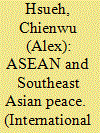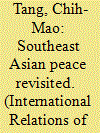| Srl | Item |
| 1 |
ID:
146165


|
|
|
|
|
| Summary/Abstract |
The Southeast Asian peace literature points out at least three points of view regarding regional peace: some emphasize ASEAN's successful security management, others doubt its effectiveness, and a third body of research argues that it is achieved by a ‘capitalist peace’ trajectory. In this article, I refute the capitalist peace argument and construct a theory to bridge the two contradictory perspectives on ASEAN, arguing that the pacifying effect of ASEAN should be understood as a conditional one, which hinges on Southeast Asian countries’ economic performance. For decades, nation building and economic growth have been the main goals of Southeast Asian countries as well as the foundation to their leaders’ rule given the countries' distinct historical backgrounds. When the leaders are not able to maintain good economic performance, they tend to emphasize the nation building issues, such as provoking territorial disputes, to keep their ruling legitimacy, thus compromising ASEAN's security management. Empirical analysis of the onset of militarized interstate disputes from 1950 to 2001 confirms my argument.
|
|
|
|
|
|
|
|
|
|
|
|
|
|
|
|
| 2 |
ID:
115014


|
|
|
|
|
| Publication |
2012.
|
| Summary/Abstract |
The scholarship has argued that the Association of Southeast Asian Nations (ASEAN) security management, outweighing democracy and economic interdependence, is the main force constituting Southeast Asian peace. However, although neither democracy nor economic interdependence significantly contributes to peacefulness in Southeast Asia, this study posits and finds that prior literature overlooks the possible conflict-constraining effect of a ruling group's desire and resolve to pursue economic development with liberal capitalist economic policy, which causes that the pacifying effect of ASEAN security management to be exaggerated. This study distinguishes the conflict-constraining effect of liberal capitalist economic development policy from the outcome effects of economic interdependence and the ASEAN security management and argues that the common interests and preferences of adopting economic liberalization policy for economic development exert a more significant effect in preventing conflicts in Southeast Asia. Empirical analyses of the onset of militarized interstate disputes between Southeast Asian states from 1950 to 2000 support this argument.
|
|
|
|
|
|
|
|
|
|
|
|
|
|
|
|